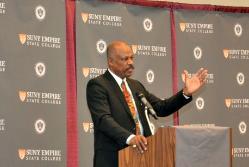This section of the SUNY Empire website is no longer being updated.
View current SUNY Empire Stories.
March 20, 2017
University of the West Indies Vice Chancellor Sir Hilary Beckles Delivers Boyer Lecture at All College Conference

Sir Hilary McDonald Beckles, vice chancellor of The University of the West Indies and a native of Barbados, delivered the Boyer Family Lecture on Wednesday, March 22, in the Saratoga Springs City Center, meeting room 2, a highlight of the annual All College Conference.
His address explored “Reparatory Justice and Economic Development: Critical Support for the Social Growth Paradigm in the Caribbean.” Sir Hilary is an internationally renowned historian, with expertise in Afro-Caribbean history, especially the economic and social impacts of colonialism and the African slave trade. In December 2014, Sir Hilary delivered the feature address to The United Nations General Assembly to launch the International Decade for People of African Descent.
The Sir Hilary's Boyer lecture marks the beginning of the Year of the Caribbean, the first theme in a new SUNY Empire initiative designed to explore a topic intensively through linked courses, cultural events and celebrations, art exhibits, webinars, seminars, service learning projects, student and alumni gatherings, speakers, articles in the college magazine and other experiences.
“Reparations is a topic I have been asked to research and write about in recent years,” he said. “In a ceremony at the United Nations, I spoke about how education can alleviate many of the legacies in the Caribbean that resulted from a history of slavery and colonialism. Reparations lead to democracy and democracy is founded on the notion of inclusion. The greater the inclusion of more people into the center of decision-making – black, brown, women, etcetera – the stronger the democracy.”
He said that the 21st-century democratic movement will integrate many marginalized people and that role of education will be to make the community part of the democracy via the “education pipeline” that will help people become part of the economy and make contributions, including to New York state, where many have chosen to live.
In the case of Caribbean people, he noted, “In the last 50 years, we have come to see the United States as part of our own survival, as people from the Caribbean move to the U.S. and to New York state, and many individuals and corporations from the U.S. see the Caribbean as important to their survival as well, as a core of economic development.
“We have been seeking to create a template for cooperation and engagement ever since the British Empire in the Caribbean collapsed. Many people of the Caribbean saw Britain as colonial, but the U.S. as a historic and future ally. Many Caribbean people in their post-colonial journey moved to the United States.”
Now, he said, “The interaction helps those citizens of Caribbean descent become better Americans.” He named Colin Powell, Eric Holder, Harry Belafonte and Sidney Poitier as Americans with Caribbean heritage that young people “emulate.” He added, “Through education, we achieve social growth.”
Sir Hilary believes the future can be shaped by education and he is enthused about the SUNY-UWI partnerships, especially collaborative research the two already have conducted on many fronts, including health care, climate change and online education. He said that now, with “Empire State College providing the roof on this house, we can shift from research to real engagement, which will play a role in facilitating empowerment among Caribbean people.
“It’s a logical partnership,” he said. “It’s a win-win on multiple levels.”
About Sir HilaryMcDonald Beckles
Sir Hilary was educated at the University of Hull in England. He began his academic career at UWI, and was granted a personal professorship at age 37, the youngest in the university's history. He was named pro-vice-chancellor and chairman of UWI's Board for Undergraduate Studies in 1998, and, in 2002, was named principal of the university's Cave Hill campus. He also has had a longstanding involvement with West Indian cricket, and served on the West Indies Cricket Board, and has written extensively about the history and role of the sport.
He was named Author of the Year in 1991 by Barbados Cultural Promotions, and “We Now Have a Country,” a documentary that he wrote, narrated and co-directed, was named Documentary of the Year in 1993 by the Barbados Association of Journalists. The following year, he was named the inaugural winner of the UWI Vice Chancellor's Award for Excellence in the Field of Research. In 2004, Sir Hilary was awarded an honorary Doctor of Letters by his alma mater, the University of Hull. He has since received equivalent honorary degrees from the Kwame Nkrumah University of Science and Technology, Ghana, in November 2009, and from the University of Glasgow, Scotland, in June 2011. In November 2007, Beckles was made a Knight of St. Andrew, the highest honor possible in the Order of Barbados.
Additionally, Sir Hilary serves on the editorial boards of several academic journals, including William and Mary Quarterly, Journal of Caribbean History and Sports in Society, and is an international editor for the Journal of American History. Outside of academia, he was the leader of Barbados delegation, 2001 World Conference Against Racism; director, ICC West Indies Cricket World Cup, Inc. (2005–2007); independent director and member of Corporate Governance & Ethics Committee, Sagicor Financial Corporation (2005 onward); director, Sagicor Life Jamaica Limited (2006 onward); and a board member, Association for the Study of the Worldwide African Diaspora (2013–2015).
About the Boyer Family Lecture
The annual Boyer Family Lecture was established in 2004 by Kathryn Boyer ’78 in to honor her late husband, Ernest L. Boyer Sr., chancellor of the SUNY system from 1970 to 1977, who was instrumental in the founding of Empire State College in 1971, as well as their son, Stephen Paul Boyer ’86, a mentor at the college’s Center for Distance Learning, and grandson Gabriel Boyer ’04.